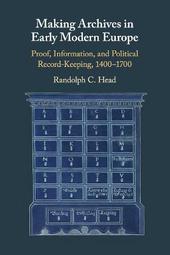
|
Making Archives in Early Modern Europe: Proof, Information, and Political Record-Keeping, 1400-1700
Paperback / softback
Main Details
| Title |
Making Archives in Early Modern Europe: Proof, Information, and Political Record-Keeping, 1400-1700
|
| Authors and Contributors |
By (author) Randolph C. Head
|
| Physical Properties |
| Format:Paperback / softback | | Pages:366 | | Dimensions(mm): Height 230,Width 153 |
|
| ISBN/Barcode |
9781108462525
|
| Classifications | Dewey:930.1 |
|---|
| Audience | | Professional & Vocational | |
|---|
| Illustrations |
Worked examples or Exercises; 15 Halftones, black and white; 4 Line drawings, black and white
|
|
Publishing Details |
| Publisher |
Cambridge University Press
|
| Imprint |
Cambridge University Press
|
| Publication Date |
20 August 2020 |
| Publication Country |
United Kingdom
|
Description
European states were overwhelmed with information around 1500. Their agents sought to organize their overflowing archives to provide trustworthy evidence and comprehensive knowledge that was useful in the everyday exercise of power. This detailed comparative study explores cases from Lisbon to Vienna to Berlin in order to understand how changing information technologies and ambitious programs of state-building challenged record-keepers to find new ways to organize and access the information in their archives. From the intriguing details of how clerks invented new ways to index and catalog the expanding world to the evolution of new perspectives on knowledge and power among philologists and historians, this book provides illuminating vignettes and revealing comparisons about a core technology of governance in early modern Europe. Enhanced by perspectives from the history of knowledge and from archival science, this wide-ranging study explores the potential and the limitations of knowledge management as media technologies evolved.
Author Biography
Randolph C. Head is Professor of History at the University of California, Riverside. He has published extensively on democracy, religious conflict, and knowledge systems in early modern Europe, particularly Switzerland. His publications, which were recognized by the Max Geilinger Prize in 2017, include Early Modern Democracy in the Grisons (Cambridge, 1995), Jenatsch's Axe (2008), and A Concise History of Switzerland (with Clive Church, Cambridge, 2013).
Reviews'Head's reach is remarkable as he tracks the concepts and practices, the people and motives behind the explosive growth of administrative archives between 1200 and 1700 across a wide swath of European polities. He combines deep dives into little-known sources with judicious reflection on the impact of archives on both early modern governance and current historical practice.' Ann Blair, Carol H. Pforzherimer Professor, Harvard University, Massachusetts 'This book provides a new understanding of different modes of organizing records and archives as shaped by medial and governance processes in Europe, between 1400 and 1700. Archives are presented as cultural and political sites being shaped by cultural and political actors. Randolph Head shows how the comparative approach - spanning places, times, languages, and cultures - is a powerful analytical tool and an invaluable method of historical investigation.' Eric Ketelaar, Universiteit van Amsterdam 'A remarkably learned exploration of finding tools, record-keeping methods and pre-modern archival theories across many European countries. Randolph Head brings order to the expanding field of the history of archives by tracing the sometimes desperate efforts of late medieval and early modern archivists who tried to order their own growing masses of documents. Highly recommended.' Filippo de Vivo, Birkbeck, University of London 'This in-depth, scholarly history is ideal for librarians, archivists, graduate students, and scholars of history, particularly the history of books.' A. H. Widder, Choice '... the main merit of the book lies in its finely calibrated balance between a general discourse on the role played by archives in the formation of European statehood and the presentation of specific documents, archives, and inventories.' Marco Cavarzere, German Historical Institute London Bulletin 'The book is a tremendous contribution to the history of archives and of early modern Europe.' Francis X. Blouin Jr., American Historical Review
|